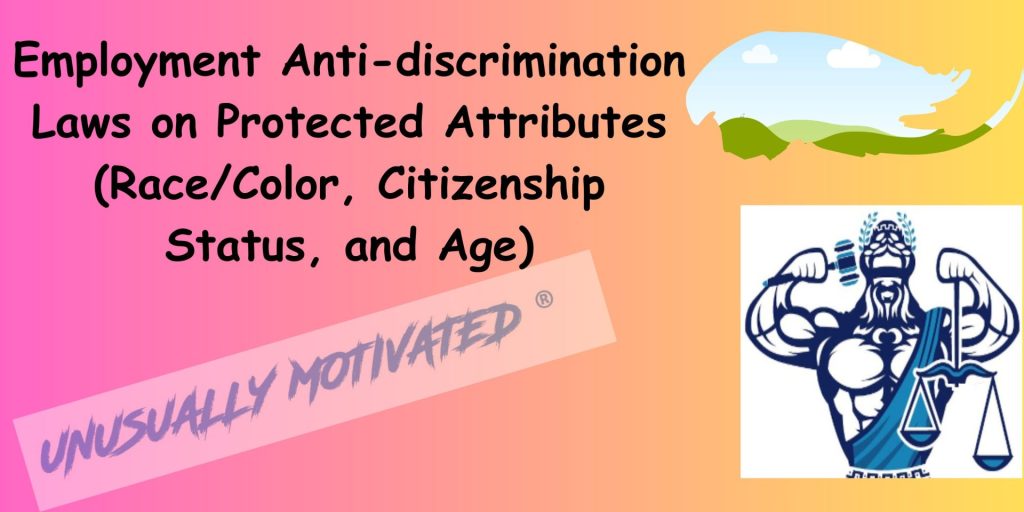Here at the Law Office of Vincent Miletti, Esq. and the home of the #UnusuallyMotivated movement, we take pride as a resilient and dependable legal services firm, providing such services in both a traditional and online, web-based environment. With mastered specialization in areas such as Employment and Labor Law, Intellectual Property (IP) (trademark, copyright, patent), Entertainment Law, and e-Commerce (Supply Chain, Distribution, Fulfillment, Standard Legal & Regulatory), we provide a range of legal services including, but not limited to traditional legal representation (litigation, mediation, arbitration, opinion letters, and advisory), non-litigated business legal representation and legal counsel, and unique, online legal services such as smart forms, mobile training, legal marketing, and development.
Still, we, here at Miletti Law®, feel obligated to enlighten, educate, and create awareness, free of charge, about how these issues and many others affect our unusually motivated® readers and/or their businesses. Accordingly, in order to achieve this goal, we have committed ourselves to creating authoritative, trustworthy & distinctive content, which looks to not only educate, but also deliver in a manner that only Miletti Law® can. Usually, this content is featured as videos posted on our YouTube Channel https://www.youtube.com/channel/UCtvUryqkkMAJLwrLu2BBt6w and blogs that are published on our website WWW.MILETTILAW.COM. With that, the ball is in your court and you have an effortless obligation to subscribe to the channel and sign up for the Newsletter on the website, which encompasses the best way to ensure that you stay in the loop and benefit from the knowledge bombs that we drop here!
Here at Miletti Law®, we are the authoritative force in Employment and Labor Law. Therefore, we are committed to updating our series on employment & labor law with fresh, verifiable, and credible content. In that spirit, this blog is Part XI of our series on New York State and City laws that apply to workplace harassment, discrimination, & retaliation. In Part X of this series, we provided an overview of “Vicarious Liability for Harassment,” as recognized by the NYSHRL & NYCHRL. At this point, we now switch gears and hammer on “Whistleblowing & Retaliation Claims” and “Liability Standards” under these New York laws and others that apply to workplace harassment, discrimination, & retaliation.
Whistleblowing & Retaliation Claims
For starters, whistleblowing and/or retaliation claims are recognized by different New York laws that include:
- The New York City Human Rights Law (NYCHRL), NYC Administrative Code 8-101 et seq.
- The New York State Human Rights Law (NYSHRL), N.Y. Exec. Law § 290 et seq.
- The New York False Claims Act, N.Y. State Fin. Law § 187 et seq.
- The New York Whistleblower Law, N.Y. Lab. Law § 740.
- Reproductive Health Discrimination, N.Y. Lab. Law § 203-e.
Liability Standards
NYCHRL
Under the NYCHRL, an employee may only prevail on a retaliation claim if it is shown that:
- The employer engaged in discriminatory conduct considered unlawful by the NYCHRL.
- The employee engaged in an action in opposition to the discrimination done by the employer.
- The employer committed an act that was reasonably likely to dissuade/intimidate/deter the employee from going on with the opposing action.
In New York, courts have broadly interpreted these NYCHRL provisions and held that scenarios where the plaintiff merely let the employer know about their disapproval of the discriminatory conduct, even before the employer retaliated, comprise an opposing action or practice. Further, the NYCHRL disapproves the rejection of any kind of challenged conduct by the employer as nonactionable. Unless it is reasonably concluded by a jury that, based on the evidence provided, a plaintiff could have been deterred from taking part in a protected activity by the employer’s conduct, courts should not deem such challenged conduct as non-retaliatory.
NYSHRL
The NYSHRL prohibits employers from retaliating (terminating or discriminating) against unpaid interns and employees for opposing any conduct considered unlawful by the Act or for participating in a proceeding or filing a complaint under the NYSHRL. Usually, the standard being applied in evaluating claims under Title VII of the Civil Rights Act of 1964 is adopted by courts when they evaluate retaliation claims under the NYSHRL.
Reproductive Health Discrimination
Under the New York State Labor Law, it is unlawful, in relation to reproductive health discrimination, for an employer to penalize, demote, suspend, or otherwise discharge an employee who:
- Testifies before, or provides information to, any public body conducting an inquiry, hearing, or investigation into any such violation of regulation, rule, or law by such employer.
- Threatens or makes a complaint about the violation of the rights guaranteed under N.Y. Lab. Law § 203-e (reproductive health discrimination) to a public body, co-worker, or employer.
- Causes the institution of any proceeding related to or under N.Y. Lab. Law § 203-e (reproductive health discrimination).
As provided for under N.Y. Lab. Law § 203-e(5), employers are subject to separate civil penalties if they engage in any acts of retaliation against employees who exercise any rights granted under N.Y. Lab. Law § 203-e (reproductive health discrimination).
In Part XII, we will move forward the discussion and cover “Disability-Related Protections” under these New York laws applicable to workplace harassment, discrimination, & retaliation.
Until then, stay tuned for more legal guidance, training, and counsel. In the interim, reach us with questions or comments on our website at the Contact Us page!
Always rising above the bar,
Isaac T.,
Legal Writer & Author.
 Professional Legal & Business Services And Representation - English & Espanol!
Professional Legal & Business Services And Representation - English & Espanol!

 314-648-2586
314-648-2586 CALL US NOW
CALL US NOW








